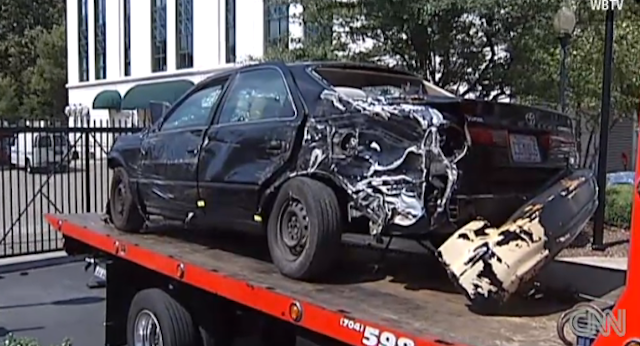24-year-old Jonathan Ferrell was in bad shape. Some time around 2:30 A.M. early Saturday morning, the former FAMU safety wrecked his Toyota Camry in the Bradfield Farms section of Charlotte, North Carolina.
The above is the car he was driving. As of yet, the cause of the accident is unknown, but it was serious enough that he was forced to climb out of the rear window.
Ferrell sought help at the first house he could find. Instead of finding help, he found a woman who mistook Ferrell's urgent door knocks for her husband's, but upon opening the door believed Ferrell to be an intruder. She hit her security system's panic alarm and called 911 to report a breaking and entering attempt.
A short time later, police arrived on the scene and located Ferrell a short distance away, according to a description given by the woman. According to accounts from Charlotte-Mecklenburg police, Ferrell ran towards the officers, possibly in a state of shock or confusion. One officer fired a Taser at Ferrell, but it either missed or otherwise failed to stop him. The lethal rounds fired from 27-year-old Randall Kerrick's service weapon, however, did.
Ferrell died shortly afterwards.
Kerrick was charged with involuntary manslaughter on the same day. That afternoon, he turned himself in and was later released on a $50,000 bond. Two other officers who accompanied him were placed on administrative leave. An investigation found that Kerrick had used excessive force:
"The evidence revealed that Mr. Ferrell did advance on Officer Kerrick and the investigation showed that the subsequent shooting of Mr. Ferrell was excessive," police said in another statement issued late Saturday night. "Our investigation has shown that Officer Kerrick did not have a lawful right to discharge his weapon during this encounter."
Kerrick's rather swift arrest and charging may have been policy, or it could have been in response to the events surrounding the death of Trayvon Martin. Some are playing the cynic's gambit, assuming that Kerrick won't be convicted and will be back on active duty in due time.
Meanwhile, many are wondering whether Ferrell's ultimate fate was determined by his skin color. Given the countless encounters between black Americans, whites and majority-white law enforcement that have gone terribly wrong - perhaps.
For instance, was the woman's genuine reaction was based on ethnic prejudice rather than actual concern for her safety? It's unclear whether or not she knew he had just been involved in an accident. If so, then why did she choose to report her encounter with Ferrell as a B&E instead of a car crash? And if Ferrell was white, would she had been more inclined to help him?
As for the police, what led Kerrick to use his service weapon as opposed to his own Taser or even pepper spray/OC spray after the first tazing attempt failed? Would Kerrick had been less inclined to shoot and ultimately kill Ferrell if he was white? Could there have been any other way to secure their own safety and that of Ferrell's if it had been possible? If so, would this alternative had been exercised if Ferrell wasn't black?
According to reports, Ferrell was as straight as an arrow with nary a criminal record to be seen, so the narrative that's sure to follow shouldn't come into play here.
Plenty of details need to be fleshed out before further study can be done. On the face of it, however, it seems like just another case of a young, promising life snuffed out by prejudice and over-zealousness.



